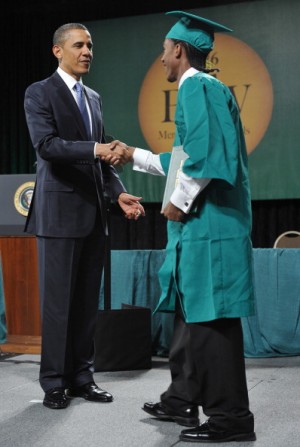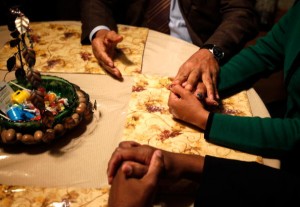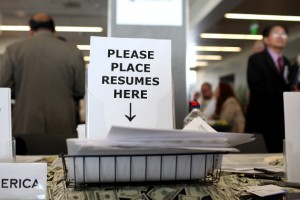The jobless rate for black men ages 16 to 19 is 45 percent. The Washington Post chronicles the job hunt of one black male teen, Kenneth Roberson of Memphis. The recent Booker T. Washington High school graduate was a top-ranked student at his school, which was described by President Barrack Obama as one of the nation’s most inspiring.
For Roberson, the implications of 45 percent are more immediate and more personal. It means a 45 percent chance he will have to borrow money for school or risk forgoing his partial scholarship to the University of Tennessee at Chattanooga; a 45 percent chance that he will be stuck without a car in a house with his mother and four siblings, sleeping on a futon in the room he shares with his brother; a 45 percent chance that he will go “crazy or something,” he said, “because I hate sitting in the house and having that feeling of just waiting around and being worthless.”

Mandel Ngan/AFP/Getty
President Obama greets Christopher Dean during Booker T. Washington High School's May 2011 graduation ceremony. Obama called the school one of the country's most inspiring.
Roberson and his peers face an uphill battle in trying to find jobs to help pay for school. But what if he was a little older and already had his college degree — would finding a job be more difficult for him than for a white college graduate?
Colorlines has posted a number of illuminating graphics that indicate, yes: Jobless rates are much higher for black and Latino college graduates than their white peers. According to the Economic Policy Institute, the jobless rate for black college graduates under 25 was 19 percent in 2010. For whites, it was 8.4 percent. Colorlines reports:
Even among those who’ve made the right choices—be it finishing high school or loading up debt to get a college degree—jobless rates are shocking. And the longstanding racial disparity among college graduates has grown markedly worse in the course of the downturn.
In D.C. as a whole, the unemployment rate was 9.6 percent in April, according to the U.S. Department of Labor. But in predominately black Wards 7 and 8, it’s as high as 20 percent. And teens looking for work may be out of luck this summer, as the city’s summer jobs program faces funding cuts and will be accepting 8,000 fewer youth than last year.





